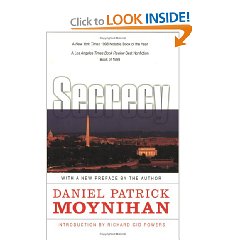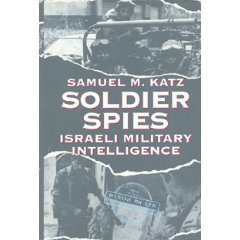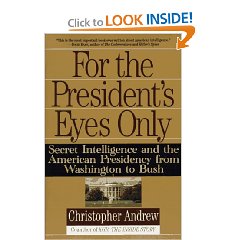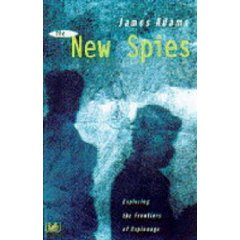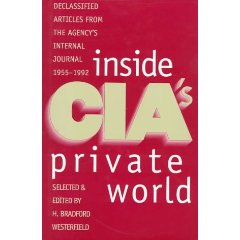Review: Intelligence Power in Peace and War
5 Star, Diplomacy, Information Society, Intelligence (Government/Secret), War & Face of BattleReview: Soldier Spies–Israeli Military Intelligence
5 Star, Intelligence (Government/Secret)Review: For the President’s Eyes Only–Secret Intelligence and the American Presidency from Washington to Bush
5 Star, Executive (Partisan Failure, Reform), Intelligence (Government/Secret)Review: New Spies–Exploring the Frontiers of Espionage
4 Star, Intelligence (Government/Secret)Review: Bombs, Bugs, Drugs, and Thugs–Intelligence and America’s Quest for Security
5 Star, Asymmetric, Cyber, Hacking, Odd War, Crime (Corporate), Crime (Government), Crime (Organized, Transnational), Intelligence (Government/Secret)The opening quotation from Harry Howe Ransom says it all-“Certainly nothing is more rational and logical than the idea that national security policies be based upon the fullest and most accurate information available; but the cold war spawned an intelligence Frankenstein monster that now needs to be dissected, remodeled, rationalized and made fully accountable to responsible representatives of the people.”
Professor Johnson is one of only two people(the other being Britt Snider) to have served on both the Church Commission in the 1970's and the Aspin-Brown Commission in the 1990's, and is in my view one of the most competent observer and commentator on the so-called U.S. Intelligence Community. The book is a tour d'horizon on both the deficiencies of today's highly fragmented and bureaucratized archipelago of independent fiefdoms, as well as the “new intelligence agenda” that places public health and the environment near the top of the list of topics to be covered by spies and satellites.
Highlights of this excellent work, a new standard in terms of currency and breadth, include his informed judgment that most of what is in the “base” budget of the community should be resurrected for reexamination, and that at least 20% of the budget (roughly $6 billion per year) could be done away with-and one speculates that this would be good news to an Administration actively seeking trade-offs permitting its promised tax cut program. His overviews of the various cultures within the Central Intelligence Agency, of the myths of intelligence, and of the possibilities for burden sharing all merit close review.
He does, however, go a bridge too far while simultaneously rendering a great service to the incoming Administration. He properly identifies the dramatic shortfalls in the open source information gathering and processing capabilities of the various Departments of the Federal government-notably the Department of State as well as the Department of Commerce and the various agencies associated with public health-but then he goes on to suggest that these very incapacities should give rise to an extension of the U.S. Intelligence Community's mission and mandate-that it is the U.S. Intelligence Community, including clandestine case officers in the field and even FBI special agents, who should be tasked with collecting open sources of information and with reporting on everything from disease to pollution. This will never work, but it does highlight the fact that all is not well with *both* the U.S. Intelligence Community *and* the rest of the government that is purportedly responsible for collecting and understanding open sources of information.
On balance I found this book to be a very competent, insightful, and well-documented survey of the current stresses and strains facing the U.S. national intelligence community. The conclusion that I drew from the book, one that might not be shared by the author, was that the U.S. Government as a whole has completely missed the dawn of the Information Age. From the National Security Agency, where too many people on payroll keep that organization mired in the technologies of the 1970's, to the U.S. State Department, which has lost control of its Embassies and no longer collects significant amounts of open source information, to the White House, where no one has time to read-we have completely blown it-we simply have not adapted the cheap and responsive tools of the Internet to our needs, nor have we employed the Internet to share the financial as well as the intellectual and time burdens of achieving “Global Coverage.” More profoundly, what this book does in a way I have not been able to do myself, is very pointedly call into question the entire structure of government, a government attempting to channel small streams of fragmented electronic information through a physical infrastructure of buildings and people that share no electronic connectivity what-so-ever, while abdicating its responsibility to absorb and appreciate the vast volumes of relevant information from around the globe that is not online, not in English, and not free.

